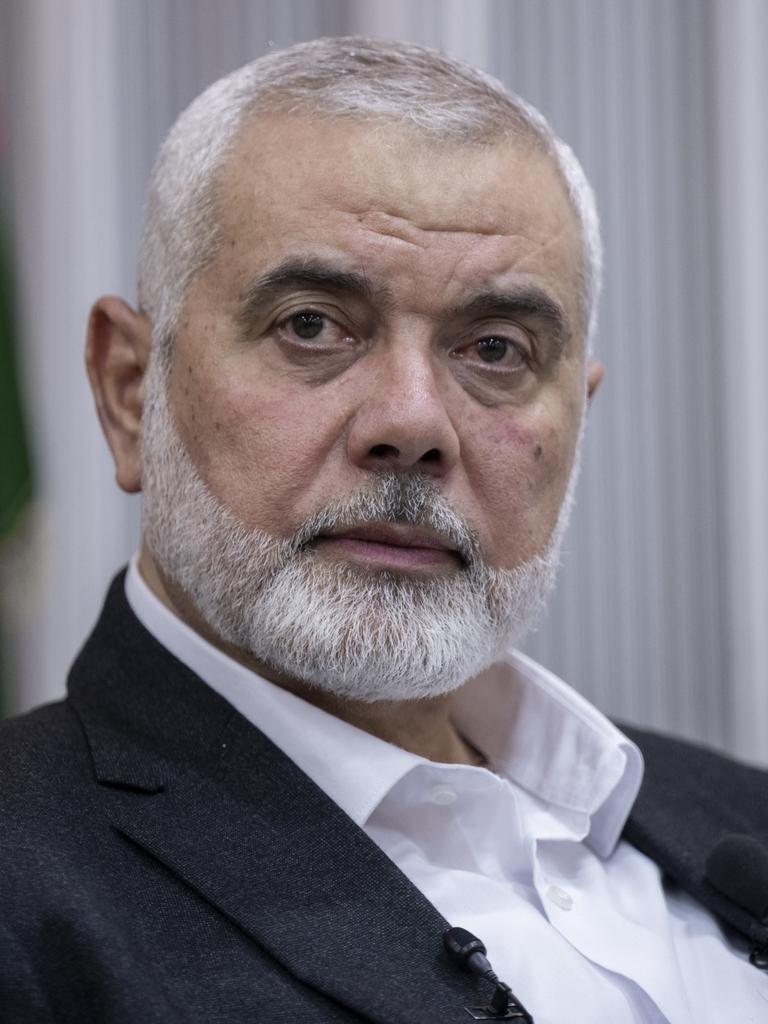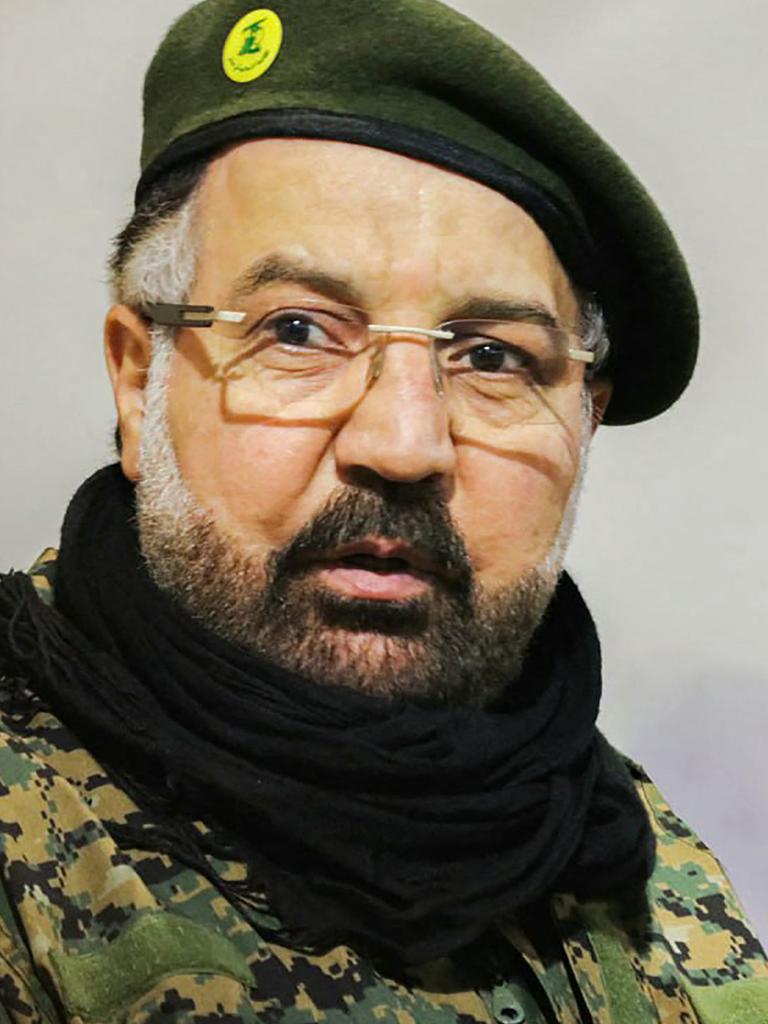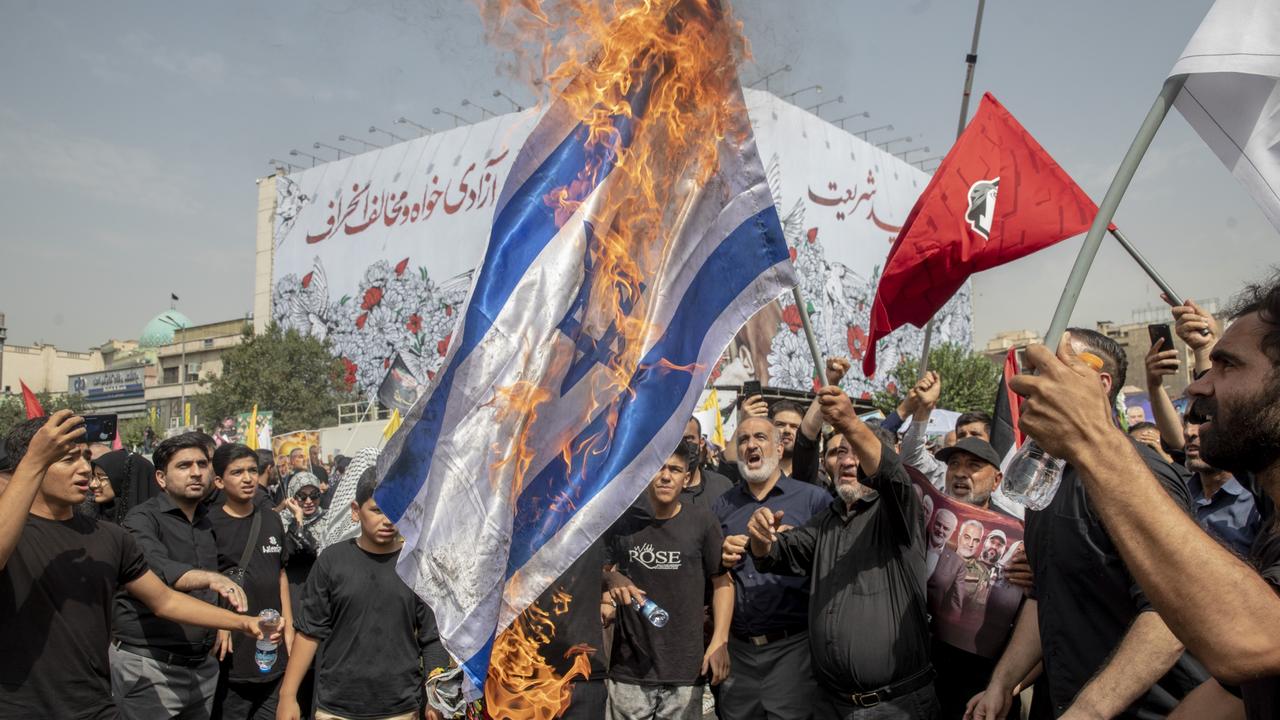‘Threats from multiple directions’ as horrifying Middle East war looms
The situation in the Middle East is now almost “out of control” as the region lurches towards a “hot” war following two brutal assassinations.
They say revenge is a dish best served cold. But inflamed passions across the Middle East and Israel are catapulting the region towards a “hot” war.
“This is an unpredictable moment,” Council on Foreign Relations Middle East expert Steven Cook said.
“It seems quite unlikely the actors will pull back from a devastating fight. This is the war for which they have all been preparing.”
Angry crowds have been gathering in the streets of Beirut, Baghdad, Tehran and other Middle Eastern capitals to vent their fury at two high-profile assassinations among Hamas and Hezbollah senior leadership.
Both are blamed on Israel.
Regional leaders are expressing frustration at the killings, saying they have all but ended any hope of a ceasefire and hostage exchange as the death toll in Gaza soars past 39,000.
US President Joe Biden and presidential candidate Kamala Harris both spoke to Israel’s Prime Minister Benjamin Netanyahu this week to promise support in the event of any large-scale retaliatory attack. But they and other international leaders are frantically trying to find ways to avoid any further intensification of the conflict.


“They will likely fail,” Mr Cook said.
“The Iranians are vowing revenge, and the Israelis are daring them and their proxies to strike.”
Hezbollah on Friday launched a volley of rockets into northern Israel after senior commander Fuad Shukr was assassinated in Beirut. Israel has admitted to the killing, saying it was in retaliation for the death of 12 Syrian-Druze children in the occupied Golan Heights.
And, in a rare move, Iran’s Supreme Leader Ayatollah Ali Khamenei personally led the funeral prayer for the Hamas political leader slain in Tehran.
Ismail Haniyeh was a guest of the state, invited to attend the inauguration ceremony of Iran’s new president, Masoud Pezeshkian.
Khamenei vowed “harsh punishment” in revenge.
Netanyahu, however, remains defiant.
“We settled the score,” Mr Netanyahu said during a video address recorded just hours after the killing of Haniyeh.
“And we will settle the score with anyone else who massacres our children, murders our citizens. Anybody who harms our country will die.”
Of revenge and rogues
“I hope we will not have war. But what Israel did in the last two days was terrible,” Lebanese Foreign Minister Abdallah Bou Habib told US media.
“It is the cause for a big war. That’s what we were afraid of.”
It’s a view shared by another of Israel’s neighbours, Jordan.
“Israel assassinated Ismail Haniyeh. He was the one who was negotiating the exchange deal. So why on earth is a country that wants to conclude a deal killing the main interlocutor in those negotiations?” Jordanian Foreign Minister Ayman Safadi said.
“The (UN) Security Council must not allow a state that has turned rogue to impose more wars and more destruction on the region”.
Mr Netanyahu, however, insists Israel has the right to conduct its revenge attacks in Gaza, Lebanon, Syria and Iran.
“We’ve achieved all of that over the past few months because we did not surrender, because we have reached some very brave decisions despite very heavy pressures from within and without,” Mr Netanyahu said.

“It wasn’t easy. I had to push back against so many pressures.”
Atlantic Council think-tank analyst Jonathan Panikoff said Israel’s assassinations were “tactical successes”.
“(But) tactical success does not always beget strategic victory, and Israel’s short- and long-term strategy remains unclear,” he wrote.
Mr Panikoff said the killing of Hamas political-wing leader and chief negotiator Haniyeh would delay hostage release and ceasefire negotiations. But he added Hamas military-wing leader Yahya Sinwar in Gaza had always held the final say.
European Council on Foreign Relations (ECFR) researcher Kelly Petillo said Haniyeh’s killing will have far-reaching effects.
“By killing Haniyeh, Israel has wiped away Hamas’ political leadership, which was the more moderate force within the movement,” Ms Petillo told German news service DW.
“The military arm will gain much more support from many Palestinians as they will be able to say: ‘Look, Haniyeh engaged in diplomacy and look where it got him’,” she said.
Retaliatory response
What form Iran’s retaliation will take is not yet clear.
But CFR Iran analyst Beth Sanner points to a statement by Iran’s mission to the United Nations that it was planning “special operations” as indicating it won’t be a repeat of April’s mass missile attack.

“Iran’s failure to prevent this will rightfully terrify the regime, but also force it to respond in some way,” Ms Sanner said.
In April, Tehran launched “Operation True Promise” – a large-scale missile and drone attack – in retaliation for the assassination of Iranian officials at its embassy in Damascus. But it provided sufficient warning of the strike for US, French, Iraqi, Qatari and Jordanian defence forces to down almost all before they reached Israel.
This time around, Tehran may also consider mobilising its “Axis of Resistance” – a loose regional alliance of Shia rebels and jihadists – to conduct raids and terror attacks.
British Chatham House think-tank analyst Bilal Saab said Iran has been exploiting inflamed tensions over the Gaza conflict to “impose a new strategic reality on Israel, in order to overwhelm it”.

“The intention is to surround the country by threats from multiple directions, which force it to fight not one, but all members of the so-called ‘axis of resistance’ – which Iran has built patiently over decades,” Mr Saab wrote.
“An attack against Hezbollah, the Houthis, the Iraqi militias, Hamas, the Syrian regime, or Iran itself, would be considered as an attack against all.”
Such a confrontation would achieve little, he said.
Wider war
“If a wider war does break out, it won’t be because of a deliberate decision by either side. It will more likely be that attempts at a measured response get out of control. Accidents and miscalculations can escalate the confrontation, as always,” Mr Saab said.
He said Mr Netanyahu’s national security strategy was yet to “seriously incorporate” regional diplomacy.

“But this has shown that there is a limit to what brute force can do to ameliorate its security situation – and what it could expect to achieve in a wider confrontation,” Mr Saab said.
“Yet Netanyahu has no qualms about extending and expanding the conflict – likely for narrow political reasons.
“He knows that the moment bullets stop flying, he will have to answer to an angry Israeli public that blames him for undermining Israeli democracy and failing to anticipate the 7 October attacks,” he said.
Lebanese Foreign Minister Bou Habib said on Thursday the US was his country’s only hope for peace.
“The US has to move quickly in this direction and make Israel stop this aggression that it’s undertaking,” Mr Habib said.
“It is the US that can only produce some results. And so far, we haven’t seen anything.”
US Defense Secretary Lloyd Austin stated earlier in the week: “If Israel is attacked, we certainly will help defend Israel.”
But he insisted the White House would “do everything we can to make sure that we keep things from turning into a broader conflict throughout the region”.
If it does, the US risks being drawn further into another Middle Eastern war.
It’s already intercepting missile and drone attacks aimed at Israel and countering Houthi attacks on shipping in and around the Gate of Tears choke point between the Red Sea and the Gulf of Aden.
“It’s uncertain that either Donald Trump or Kamala Harris could survive politically if they were to withhold aid to Israel during what Netanyahu would certainly depict as a war for Israel’s survival,” Mr Saab said.
“Such a war would have no possible military solution, and neither side could possibly win. “Even the most radical politicians in either camp understand that. Or at least, we must hope they do.”
Jamie Seidel is a freelance writer | @JamieSeidel






